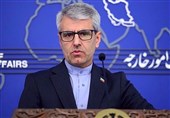Trump Imposes 25% Tariffs on Foreign-Built Vehicles, Sparking Global Backlash
TEHRAN (Tasnim) - US President Donald Trump has announced sweeping 25% tariffs on foreign-made cars and auto parts, triggering global criticism and market volatility ahead of further trade measures expected next week.
The move has provoked strong reactions from major US trading partners, with Japan, Canada, and Brazil threatening countermeasures. Japan’s Prime Minister Shigeru Ishiba said Tokyo was “considering all kinds of countermeasures,” while Canada’s Mark Carney called the tariffs a “direct attack” on Canadian workers. Brazilian President Luiz Inacio Lula da Silva stated his country “cannot stand still” in response.
“What we’re going to be doing is a 25 percent tariff on all cars that are not made in the United States,” Trump said while signing the order in the Oval Office.
The tariffs, set to take effect at 12:01 a.m. (0401 GMT) on April 3, will apply to foreign-manufactured cars and light trucks, with key auto parts also facing duties within the month.
Trump warned Canada and the European Union against retaliatory measures, threatening “large scale tariffs, far larger than currently planned,” if they collaborated to harm the US economy.
White House trade adviser Peter Navarro criticized “foreign trade cheaters” for turning American manufacturing into a “lower wage assembly operation for foreign parts,” specifically calling out Germany and Japan for retaining higher-value production in their own countries.
However, concerns emerged from within the US auto industry. Tesla CEO Elon Musk acknowledged the impact on his company, stating, “To be clear, this will affect the price of parts in Tesla cars that come from other countries. The cost impact is not trivial,” in a post on X.
The American Automakers Association urged the administration to implement the tariffs carefully to “avoid raising prices for consumers” while maintaining industry competitiveness.
Since the start of his second term in January, Trump has imposed new tariffs on key US trading partners, including Canada, Mexico, and China. The latest levies will add to existing tariffs on steel and aluminum. However, vehicles entering under the US-Mexico-Canada Agreement (USMCA) may qualify for a lower rate depending on American content, with USMCA-compliant auto parts remaining tariff-free.
Market Reaction and Economic Concerns
Trump’s latest trade measures have rattled financial markets, with uncertainty over potential economic repercussions. Stocks of major automakers declined, with General Motors and Stellantis each losing more than 3% ahead of the announcement.
In Japan, Nissan shares dropped 2.5%, Honda fell 3.1%, and Mitsubishi Motors slid 4.5%, while Mazda and Subaru each lost around 6%. South Korea’s Hyundai retreated 2.7% in Seoul.
“Imposing 25 percent tariffs on imported cars will have a devastating impact on many of our close trading partners,” said Wendy Cutler, vice president at the Asia Society Policy Institute and a former US trade negotiator. She warned that the move could undermine US commitments under existing trade agreements.
Currently, about 50% of cars sold in the US are domestically manufactured. Among imports, roughly half come from Mexico and Canada, with Japan, South Korea, and Germany also being key suppliers. However, more than half of US-built vehicles rely on foreign components, according to a White House official.
The American Automotive Policy Council, which represents Ford, General Motors, and Stellantis, cautiously welcomed the move but stressed that “it is critical that tariffs are implemented in a way that avoids raising prices for consumers.”
A study by the Center for Automotive Research previously estimated that US tariffs on metals and imported vehicles could raise car prices by thousands of dollars and negatively impact the job market.
Expanding Trade Actions
Beyond the auto industry, Trump is also considering tariffs on pharmaceuticals, semiconductors, and lumber as part of a broader trade crackdown.
Wednesday’s announcement comes ahead of what Trump has termed “Liberation Day” on April 2, when he plans to impose reciprocal tariffs on several nations to counter what Washington deems unfair trade practices.
While Trump has previously invoked emergency economic powers for some trade measures, the new auto tariffs are based on a 2019 government investigation that found excessive imports were weakening the domestic economy and could pose a national security risk.





